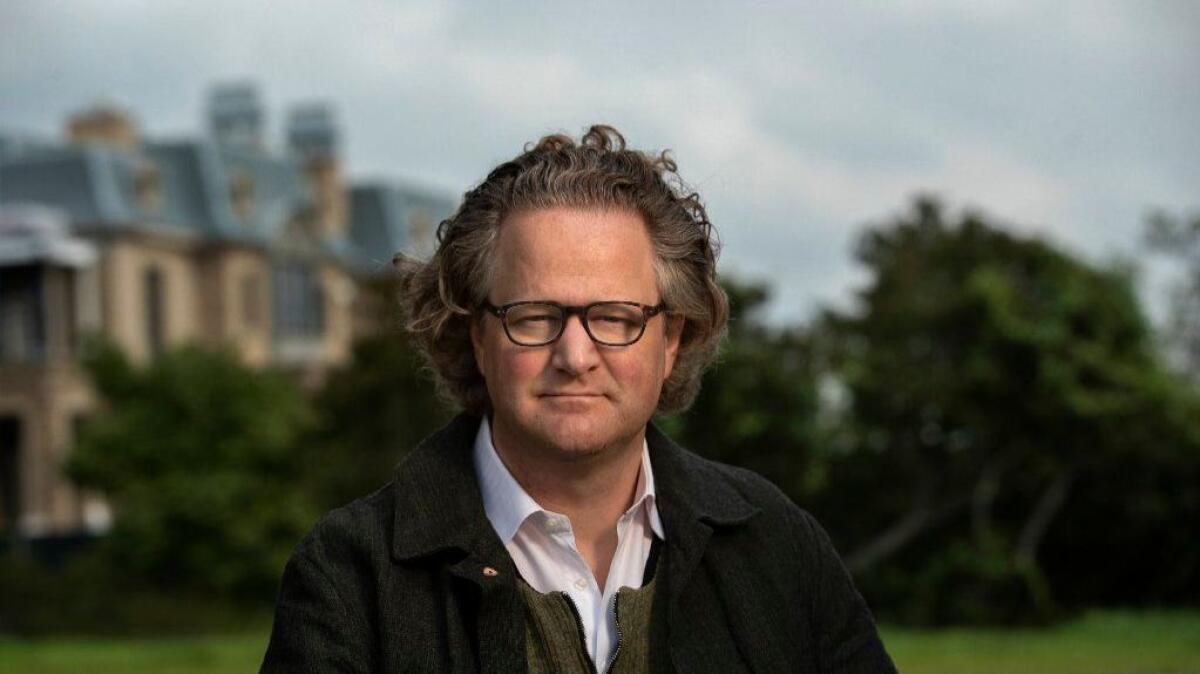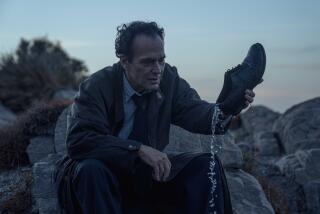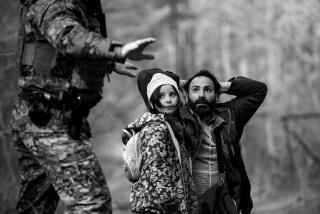‘Never Look Away’ puts director Florian Henckel von Donnersmarck back in the Oscar race

As tall as his name is long, with a baby face crowned with a thick shock of curly hair, Florian Henckel von Donnersmarck folded his 6-foot-9 body awkwardly into a chair in a Santa Monica Mexican restaurant on a warm late-January afternoon. The German filmmaker had just flown in from New York, where he was promoting his latest film, “Never Look Away,” and his back was aching from contorting himself into an airline seat. But he wasn’t complaining.
While the constant travel and non-stop events of awards season can become a wearying hamster wheel, Von Donnersmarck was bursting with enthusiasm to discuss “Never Look Away,” a sweeping drama that has earned a foreign language Oscar nomination and is itself bursting with themes of art, love and politics.
“This is a film about things that I really care about and I like thinking about, so it’s actually a great pleasure to talk about,” said Von Donnersmarck, 45. “I’ve never before enjoyed so much the conversations after screenings with the audience and the critics because I learn something every time.”
For Von Donnersmarck, “Never Look Away,” which begins a full-fledged theatrical run in Los Angeles on Friday after a brief awards-qualifying stint last year, marks a return to the Oscar race after winning the foreign-language trophy for his debut film, the acclaimed 2006 Cold War-era drama “The Lives of Others.” For many critics, the new film — which picked up a surprise cinematography nod for Caleb Deschanel as well — also marks a return to form for the director following 2010’s widely panned romantic dramedy “The Tourist.”
Inspired by the life of painter Gerhard Richter and spanning three tumultuous decades of German history, “Never Look Away” follows an aspiring painter (Tom Schilling) as he develops his artistic vision and falls in love with a woman (Paula Beer) whose father (Sebastian Koch) is hiding a murderous Nazi past. Running over 3 hours and filmed in four countries — Germany, Poland, the Czech Republic and Italy — the film has the scale and storytelling ambition of an epic novel, which is no accident.
“For most of my life, I wanted to be a novelist,” said the German-born Von Donnersmarck, who grew up in New York, Brussels, Frankfurt and West Berlin and is fluent in English, German, French, Russian and Italian. “I always set out to put the same intensity of experience and psychology into a movie that I had so loved in novels. I always want to put all of life into a movie.”
Over a four-hour breakfast with Von Donnersmarck, Deschanel — who has earned five previous Oscar nominations for his work on films like “The Right Stuff,” “The Natural” and “The Patriot” but has never won — was hooked by the director’s pitch for the film.
“What I really loved about the story was how it was able to get at the mystery of what it is for people to create and where that inspiration comes from,” said Deschanel. “That was always an element of what we tried to bring to the movie as well, to make it a moving painting as much as we could.”
Deschanel’s only prior experience working on a foreign language film had been on 2002’s “The Passion of the Christ,” which featured primarily Aramaic and Latin dialogue. “It ended up being really fun,” he said. “If you don’t understand the language, it makes you watch people much more closely and you can really notice performances and the way people behave and the rhythms of their speech.”
Fascinated with the process by which artists can transmute their suffering into something transcendent, Von Donnersmarck had initially planned to center his story on the world of opera.
“I’d had this idea that it would be great to tell the story of a composer who had all the problems that we all have in life and then he goes back to his little apartment and turns them into these beautiful arias,” he says. “But I looked through the origin story of all of my favorite operas, and I didn’t find anything personal like I was looking for.”
Looking elsewhere for inspiration, Von Donnersmarck began researching Richter, who is widely regarded as perhaps the most important contemporary German artist. Richter’s life, which had been deeply impacted by both the Nazi era and the repression of communist East Germany, fascinated Von Donnersmarck, and the director ended up spending hours talking with the largely reclusive 86-year-old artist and developing a fictionalized version of his story.
The relationship, however, has since soured. Though Von Donnersmarck says he read the entire script to Richter and stressed to him he was not making a biopic, Richter has publicly distanced himself from “Never Look Away,” telling the New Yorker magazine that the film “managed to abuse and grossly distort my biography.”
“He hasn’t seen the film, so in a way, it’s more on principle,” Von Donnersmarck says with a hint of sadness. “He is reacting as if I had somehow appropriated [his life story] against his will, and that’s, of course, not the case. But I wasn’t surprised. I think if you’ve lived in regimes that have defined you, maybe you just don’t like anything that you perceive as an attempt to define you.”
FULL COVERAGE: Oscar nominations 2019 »
For Von Donnersmarck, “Never Look Away” represents a return to his European filmmaking roots after what proved to be a bumpy detour into big-budget Hollywood filmmaking.
In the wake of “The Lives of Others,” which told the unsettling story of an East German Stasi agent who spies on a playwright, Von Donnersmarck felt an urge to do something lighter. When the script for a European-set romance called “The Tourist” came his way, with Angelina Jolie and Johnny Depp set to star, the director — whose sensibility had been shaped early on by American cinema — jumped at the chance.
“Angelina Jolie contacted me about this project she had, and I thought, ‘We could turn this into a very light and beautiful Christmas present for the audience,’ ” Von Donnersmarck said. “That’s how I saw it — it was like making some really light soufflé of some kind.”
But Sony Pictures, which released “The Tourist,” had different ideas, according to Von Donnersmarck.
“The studio decided they were going to market it as an action-thriller, which really couldn’t have been further from what it was,” he said. “So I think the critics thought, ‘OK, Florian is not doing another serious film; he’s doing an action-thriller — that’s weird. This must be really thrilling and really full of great action.’ Suddenly along comes this light travel romance, and people say, ‘This is a terrible action-thriller.’ ” He laughed. “Well, yes!”
Nominated for three Golden Globe Awards, including best musical or comedy, the film was singled out for mockery by the show’s host, Ricky Gervais. (“I’d like to quash this ridiculous rumor going around that the only reason ‘The Tourist’ was nominated was so the Hollywood Foreign Press could hang out with Johnny Depp and Angelina Jolie,” Gervais cracked. “That is rubbish. That is not the only reason. They also accepted bribes.”)
Nevertheless, despite largely withering reviews and an underwhelming $68 million domestic gross, “The Tourist” ultimately proved a box office success worldwide, grossing more than $200 million overseas. “It taught me an interesting lesson: that the expectations with which people go into a film is a very essential part of the way they see it,” Von Donnersmarck said.
Having whipsawed from the Oscar glory of “The Lives of Others” to the bruising experience of “The Tourist” and back into the Oscar race once again, Von Donnersmarck finds himself unsure at this point what he wants to do next.
In some ways, as he prepares to move with his wife and three children from Germany to Los Angeles, he finds himself caught between two worlds. He is drawn to the grandeur and scale of Hollywood moviemaking, yet he has thus far found his greatest success in his native Europe. He has just made an Oscar-nominated film about an artist who perseveres through monumental challenges, yet he finds himself being buffeted by the seismic shifts rocking today’s movie business.
“I have many ideas for films, but we’re at a point where film is changing massively almost on a monthly basis and maybe I have to see where things are going,” Von Donnersmarck said. “Should I now be thinking in terms of cinema, or is that era over? I’m not saying that in a bitter way. You move with the times, and the tool set of a director in making a miniseries or a series or a film for Netflix or Amazon is exactly the same.”
He paused. “It’s just, I don’t know if we have to accept that cinema is dying. I haven’t quite answered that question for myself yet.”
Twitter: @joshrottenberg
More to Read
Only good movies
Get the Indie Focus newsletter, Mark Olsen's weekly guide to the world of cinema.
You may occasionally receive promotional content from the Los Angeles Times.











